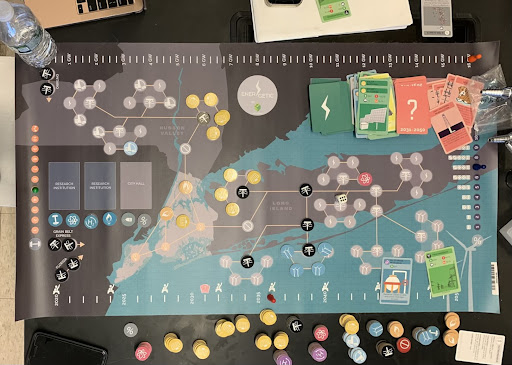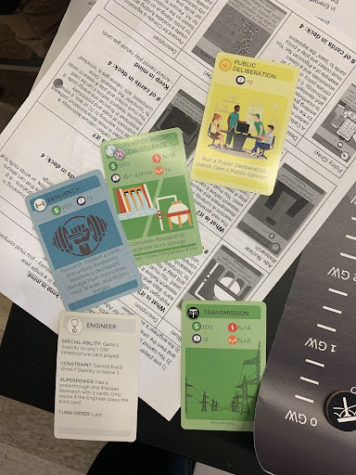Grappling With Climate Change Through the Energetic Board Game
Climate change has far-reaching effects on various aspects of our lives, and the board game Energetic helps model some of the plausible solutions.

Here is a play through of the board game Energetic in Mr. Sarker’s class.
Imagine being in flames, baking in an oven, spinning in a microwave, or frying on a pan. The heat around us is rocketing, but there is no cooling period, no ice, only endless flames in the distance. This is the current state of the climate. Is there a possible way to restore the green Earth?
Global warming has been a long debated topic, but its consequences are visible and detrimental in the long run. It is an ongoing process with effects on all sectors of our lives. According to the National Centers for Environmental Information, January global surface temperature was 1.57°F (0.87°C) above the 20th-century average of 53.6°F (12.0°C), ranking as the seventh-warmest January in the 174-year record and has the greatest impact on the lives of the lower class. According to the United Nations, the effects of rising temperatures have left “an estimated 23.1 million people on average each year,” vulnerable to poverty.
Specifically, temperature, precipitation, sea level rise, and extreme weather occurrences have all dramatically altered New York City, adding to the irreversible damage of climate change. One of the solutions to this increased temperature is to invest in renewable and green energy in replacement of fossil fuels. Green energy is a subcategory of renewable energy that has a zero-emissions profile and reduces carbon footprints to deliver the most environmental benefit. Renewable energy comes from sources that can be generated in infinite supply. Ideally, the damage control would end here and the whole world would switch to renewable energy, but future cooperation between the public, government, and companies is necessary to mitigate its impacts and work toward sustainable solutions.
Raising awareness about climate change and its consequences is key to fostering public engagement and moving towards a greener future. Educating individuals about the environmental and economic causes, impacts, and potential solutions to climate change empowers them to make informed decisions and take meaningful actions in their daily lives.
Hence, let me introduce Energetic; a board game designed to educate students about climate issues. In the game, each player takes on a role — politician, engineer, entrepreneur, activist, or journalist — and together, all the players must come up with a plan to balance the budget, grid stability, and public opinion to build 16 gigawatts of clean power for New York City by the end of 2035.

(Ella Zheng)
“[The game] gave us an idea of some of the aspects to take into consideration when making a decision and the consequences of the decisions that were taken to provide enough green energy to power New York City,” said Jessica Chen ’24, a Bronx Science student who played Energetic.
The game comes with a map board, three card decks, 142 infrastructure pieces, and more. Each player draws two action cards each year and can place as many cards as they want as long as the prerequisites on the infrastructure or research pieces can be fulfilled. At the end of everyone’s turn, one player rolls the dice, which determines how many pink cards need to be drawn. These pink cards stimulate real-life random situations such as a drought, decrease in public opinion due to protests, market crash, the activist being muted for a turn, and so on.
Every four years, there is also an election day, in which one player rolls the dice to determine if the climate-friendly politicians maintain control of the government. An unsuccessful election leads to consequences such as a blackout or cutting the annual budget in half. The entrepreneur also gets $600 every year, plus the money made from the increase in gigawatts, which is $50 per gigawatt sustained using wind or solar power. A quick YouTube tutorial by City Atlas, the creator of the board game, or the instructions rulebook, will help in understanding the how-to of the game and answer any questions.
Energetic represents a model of reality of what politicians, activists, engineers, and others are facing in the fight in solving climate change and creating enough renewable, green, and carbon-neutral energy in New York City specifically. Spreading awareness is the first step in innovating changes. This game is slowly on the rise, receiving numerous media covers, as New York City focuses on its goal to decarbonize quickly and effectively, spreading awareness of the importance of doing so. This game is also used at universities and colleges such as Yale, Brown, Carnegie Mellon, and Barnard, as well as many high schools across the country, in to achieve this purpose.
In the game, “there were consequences which required lots of thinking for every action taken, which mimicked how the decision-making process would play out in real life,” explained Chen. Cooperation is the second step in striving for change. In this game, everyone works together to make sure that the goal can be reached by discussing plans of whether it would be a good idea to invest in building wind turbines by the coast, building transmission lines from other states, stacking solar panels in the Hudson Valley, saving up money, finishing all the researches, or going with the flow. Every team has their own plans, but the end goal remains the same.
However, there are some ways in which the game can be improved upon, which also models the difficulties of implementing green and renewable energies. “There might not always be a constant supply of money for infrastructure, and there might be spacing issues as well as environmental incompatibilities that make it unable to build certain types of infrastructure,” noted Chen.
Research in these clean energies takes lots of time and money, and building them involves great precision too. Solar panels and wind turbines are built huge in size, so they are able to provide enough energy to power the city, but in real life, there are limited spaces. The cost, efficiency, and public reviews are all essential in pushing for green energy, but is it possible?
Mr. Sarker, an AP Physics 1 and Green Design teacher at the Bronx High School of Science, explains that, “I think it is necessary. The more people who will know about these issues, the more possible solving them will become.”
Mr. Sarker spent a few days introducing the game in his classes and allowing the students to experience and play the game. He said that, “it is essential for every Bronx Science student to learn about climate change. The game was an accessible and interactive way to learn about these issues.”
Physics plays a crucial role in topics covered in Energetic; such as, nuclear research, H2 storage research, and the resilience of the infrastructures built. Furthermore, physics is an essential building block of past and recent technological advancements in energy generation, conversion and storage, and sustainable materials. The lessons taught in school about the environment, the wonders of calculus, and everything in between can be connected to the topic of climate change. “Whatever you do in school matters to the student and world. The game is able to bridge the gap between what we learn with the real world,” said Mr. Sarker, as this was his goal in introducing this game.
The game summarizes the challenges of shifting towards a clean energy source, and according to Chen, “[she] would recommend this game to other peers in Bronx Science to help them gain a better understanding of how policy works and the importance of coming to an agreement. It demonstrates why policymaking is hard and why climate change is hard to tackle at a macro level.” Though every step of the way to reaching zero carbon emissions is hard, every step matters, and through promotions of this game, it will spread the knowledge of climate change and its urgency to others.
Mr. Sarker, an AP Physics 1 and Green Design teacher at the Bronx High School of Science, comments that, “it is essential for every Bronx Science student to learn about climate change. The game was an accessible and interactive way to learn about these issues.”
Ella Zheng is a Managing and Advisory Manager and Instagram Editor for ‘The Science Survey.’ She finds passion in writing stories that inform, educate,...
